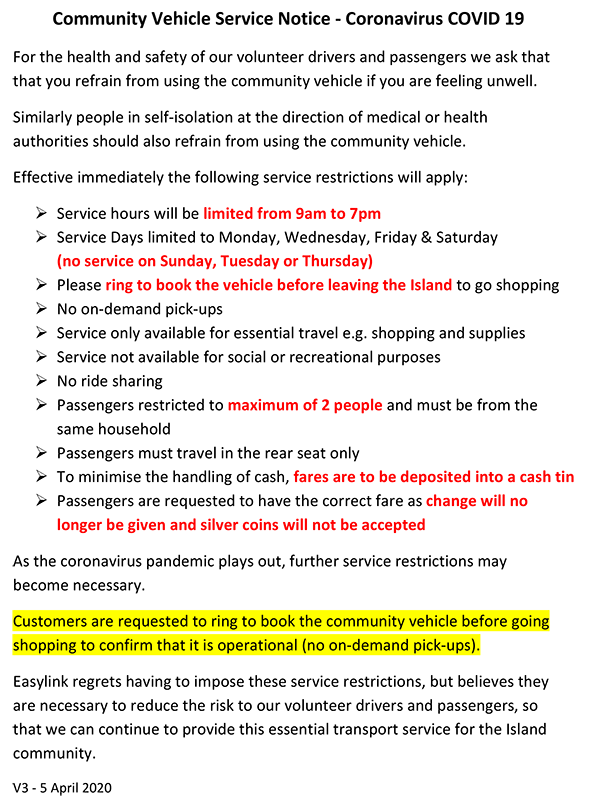| Having trouble reading this newsletter? Visit https://ymlp.com/archive_gesgjgm.php | |||||||
 |
|||||||
| April 4, 2020 | |||||||
|
Newsletter for Offshore
Residents of Pittwater, Australia
|
|||||||
URGENT CHANGES TO COMMUNITY VEHICLE AVAILABILITYDue to the impact of the governments coronavirus regulations on driver availability, it has become necessary to make further restrictions on the availability of the community vehicle.As of the 6th April the service will only be available on Monday, Wednesday, Friday & Saturday with no service available on Sunday, Tuesday and Thursday as per the notice below. Please ring to book the vehicle before leaving the Island to go shopping(no on-demand pick-ups)Easylink regrets having to impose these additional restrictions and will continue to do whatever it can to maintain this essential transport service for the Island community during these challenging times. Click image to load
file
Church Point Reserved Parking ApplicationsThe
Northern Beaches Council will be making the six unused
reserved Church Point car parking spots available to
front line workers. This, along with other temporary
changes to local parking restrictions, will go a
little way towards reducing the current extreme
parking pressures.
To facilitate a process of finding deserving recipients, SIRA has set up an information page which contains guidelines for applicants, followed by an application form. If you are an essential worker and would like to know if you qualify for a reserved parking spot, please view this link to read more. Applications close at 10am this Sunday, the 5th of April. Health UpdateFollowing
positive feedback from a previous SIRA News article in
relation to the COVID-19 pandemic and health advice,
here is some further information.
The situation is Australia is rapidly changing. The good news is that awareness across the country is high. In saying that, the Northern Beaches is one of the areas with the highest infection rates. So where are we now in what is best and legal practice? It can be very difficult to keep up to date with the fast pace of change with the advice. As such, the advice contained here will no doubt also soon be superseded. But currently the rules are designed to keep people to only interacting with their normal household and for essential business. The problem is that many aspects are vague when it comes to implementation. So the advice currently is to: 1) stay at home (no social engagements); 2) go to work if you are employed in an essential service and can not work from home; 3) go to the shops (as few people and as fast as possible); 4) to exercise in public if you have to; 5) limit all interactions with others to the minimum and keep 1.5m away from everyone else at all times; 6) limit all outdoor time to a maximum of two people (you and one other). The exceptions to the above rules are when it is in relation to people who you normally live with (your household). This does not extend to relatives if you are not in the same household. There are further exemptions and these can be found here at Schedule 1. Keep in mind this will be superseded soon no doubt. The previous SIRA News article mentioned the use of masks as ineffectual. To clarify this information, it is important to know how the virus spreads - in tiny water droplets sneezed or coughed by an infected person. This is the rationale behind a 1.5m distance that is now imposed on all people in public, if they are not members of your household. This social distancing is to match the effective distance of sneezes and coughs. Masks can help protect people in a similar way and if you are vulnerable (elderly, have a compromised immune system etc), then masks may help. The important part to note here is that you are aware that masks do not protect the wearer from the virus as the virus is not airborne - that is, travelling through the air such as a pollen to hay-fever sufferers. Essentially, simply be aware to not allow wearing a mask to give you a false sense of protection that then gives you the courage to be reckless with your activities. It has been found that some people that wear masks then need to touch their face more often to adjust the mask, and of course to eat and drink. If they have not been washing their hands due to the false sense of security they feel from wearing a mask, then they are more likely to become infected by the virus. In summary, masks will help you from others sneezing, but it is not a substitute for thorough hand hygiene and keeping away from other people. We hope this information continues to be helpful to the community. Missed out on a Previous Newsletter A complete set of past
electronic newsletters since May 2000 can be found and
read at https://ymlp.com/archive_gesgjgm.php or
by
clicking
here or by visiting the Mona Vale Library.
To ContributeIf you would like to contribute to this newsletter it's easy!. Send an e-mail to the editor (editor@scotlandisland.org.au) or by clicking here. Type your contribution (100 words or so would be fine) and assuming it is of general interest to the community, does not include matter of a political nature and is not offensive, it will appear next month.Subscription InformationTo get on and off this newsletter, click here or got to: http://www.scotlandisland.org.au/signup .To change your address, click the 'modify' link at the bottom of this newsletter or send an email to the editor@scotlandisland.org.au Follow the PON
The Online Local Contacts GuideClick HERE to loadThe
views
expressed in this newsletter are not necessarily the
views of the Scotland Island Residents Association
(SIRA), or the Western Pittwater Community
Association (WPCA)
|
|||||||
 |



